Colorado State University is renowned for its animal sciences and veterinary medicine programs. But a growing number of animals are making their presence felt on campus outside of an educational context. These are animals that accompany students and staff, either on their daily rounds as service animals, in the residence halls as emotional support animals, or just hanging out on the Oval as fun-loving pets.
They all serve a different purpose, and they all have different rules to follow. Can you tell the difference?
This is a service animal
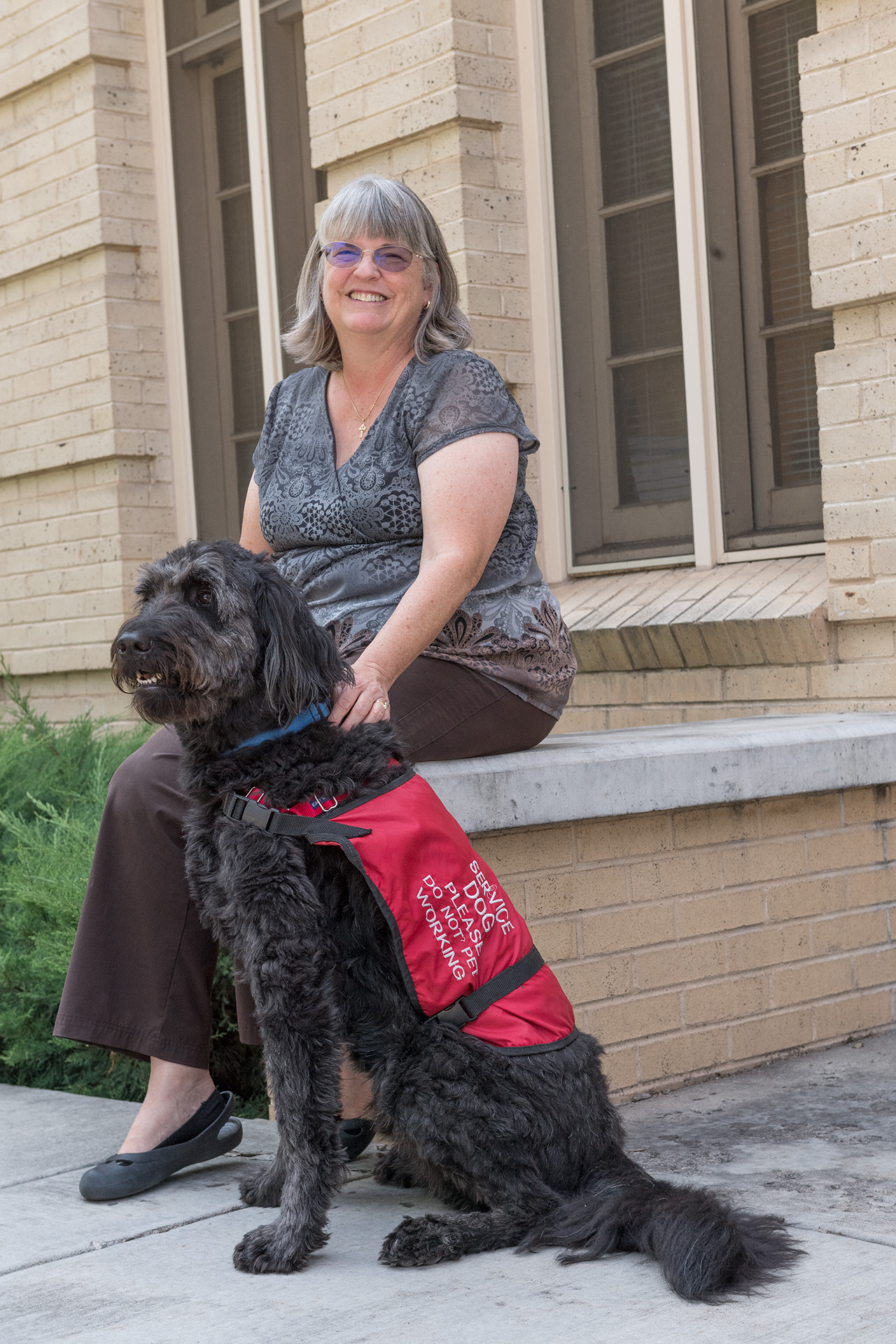
Student Disability Center open in TILT
The Student Disability Center — formerly known as Resources for Disabled Students – has new larger space in the TILT building.
Located on the Oval at one of the stops of the Around the Horn free campus shuttle, the building has accessible ramps at both the front and rear entrances.
SDC helps facilitate the educational pursuits of students who have disabilities and/or other chronic conditions, including mental health, by coordinating a variety of accommodations and services. SDC also works to ensure policies, procedures, and practices within the university environment do not discriminate against students because they have a disability.
The satellite office in the Lory Student Center remains open as well.
In addition to a new name and location, the Center also has a new website, where faculty, students and parents can learn more about the services offered and how to use them.
According to Kathleen Ivy, Student Disability Center accommodation/advocacy specialist, there are approximately 50 to 100 service dogs on campus. In fact, Kathleen has Duncan to assist her with mobility issues, and when he is not working, he stays in a crate in her office.
“The reason I don’t have a precise number is that they don’t have to register with us,” Ivy said. “But we strongly encourage anyone with a legitimate service animal to check in with SDC, in case there are ever any questions.”
Speaking of questions, there are only two questions that the Americans with Disability Act allows to be asked of individuals using service dogs:
- Is the animal required because of a disability?
- What work or task has the animal been trained to perform?
“What is essential is how the animal behaves,” Ivy explained. “If a dog causes a disturbance, barking or disobeying commands, in class or a space like the library or the student center, even if it is a legitimate service animal, the owner and the dog will be asked to leave.”
This is a service animal
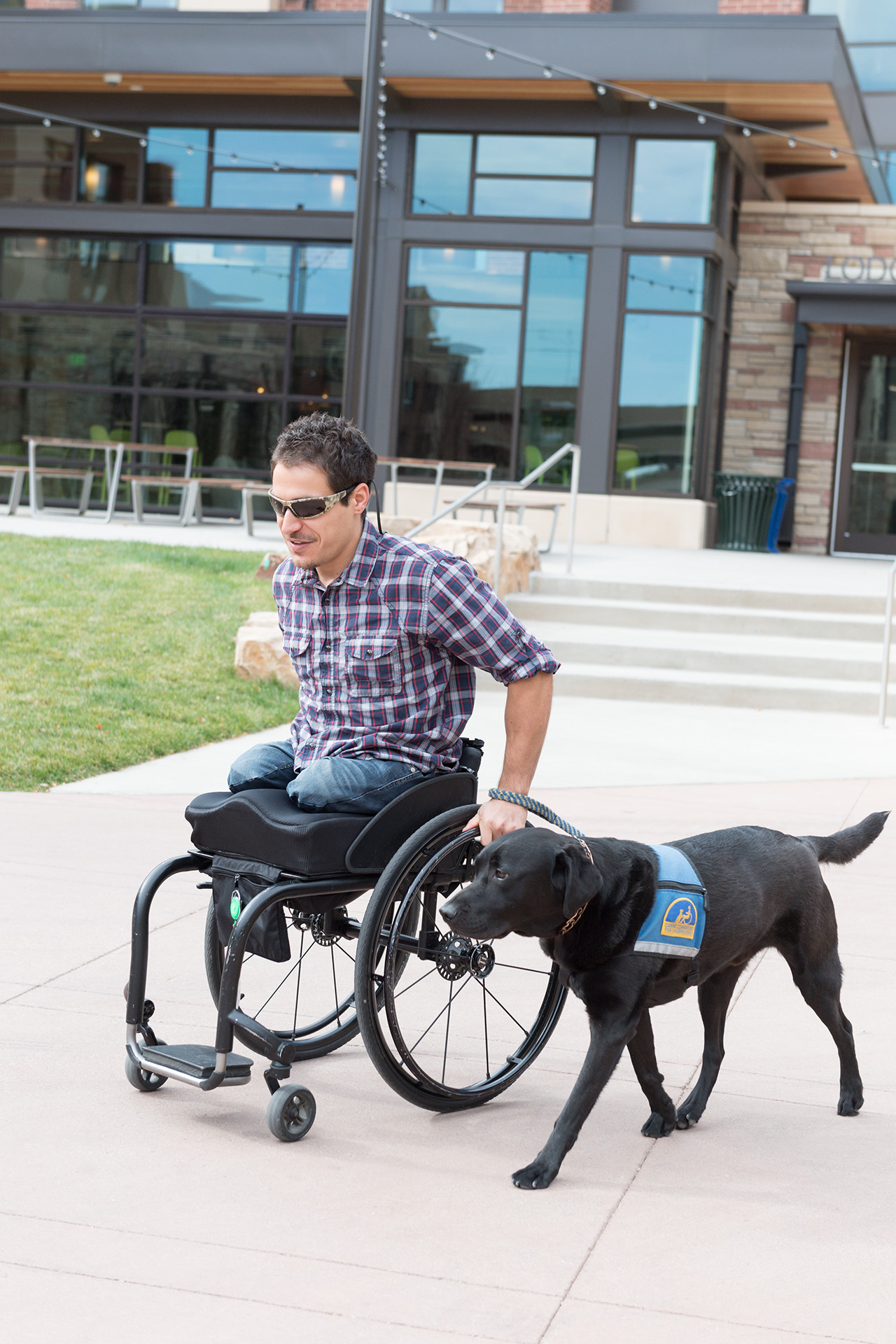
Some service animals perform fairly obvious functions, and there is no need to ask the two questions. However, there are several types of services they can perform, some of them for disabilities not apparent at first glance.
- Seeing Eye dogs – help visually impaired people
- Hearing dogs – help those with auditory impairment
- Seizure or medical alert dogs – can anticipate an oncoming seizure and stay with the person until it passes
- Mobility dogs – help with issues involving walking or balance
- PTSD dogs – trained to a person’s specific disability, they provide support for coping with daily life
Many service dogs wear identifying vests when they are working, but some do not. All must be on a leash or under voice command at all times while on the CSU campus.
This is a service animal
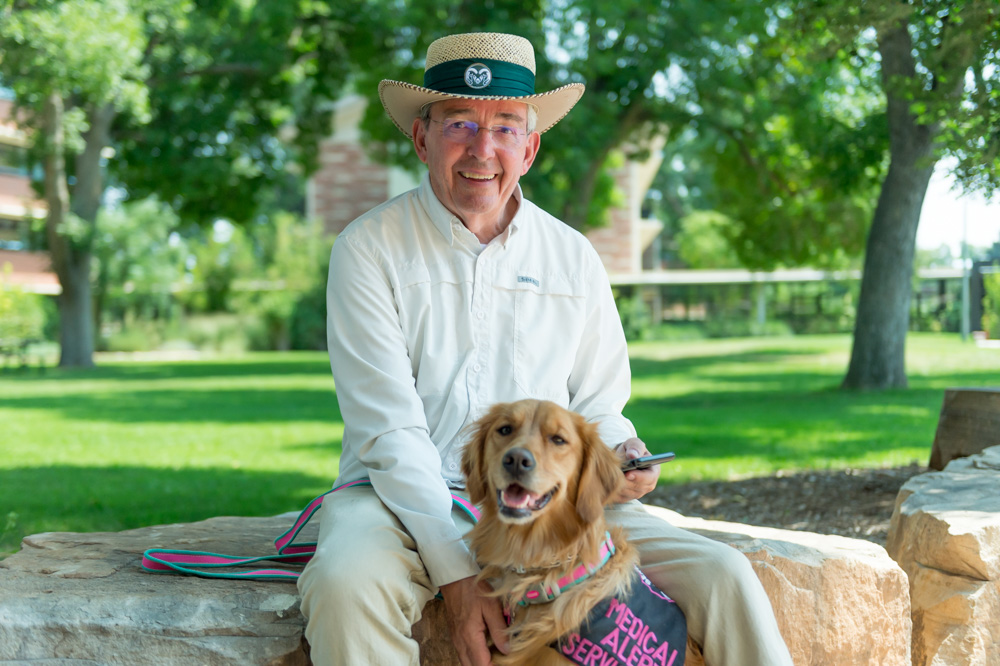
Marc Barker, director of Adult Learners and Veterans Services, estimates that a handful of the more than 2,000 student veterans on campus use service animals. “When the dog is trained to help with seizures or PTSD, you can’t see these disabilities, but the service the dogs provide is very real and very necessary to help break down barriers to veterans being students at CSU,” he said. “It can be very frustrating for our student veterans when they encounter untrained animals not under control in classrooms, for example.”
This is where service animals can go on campus
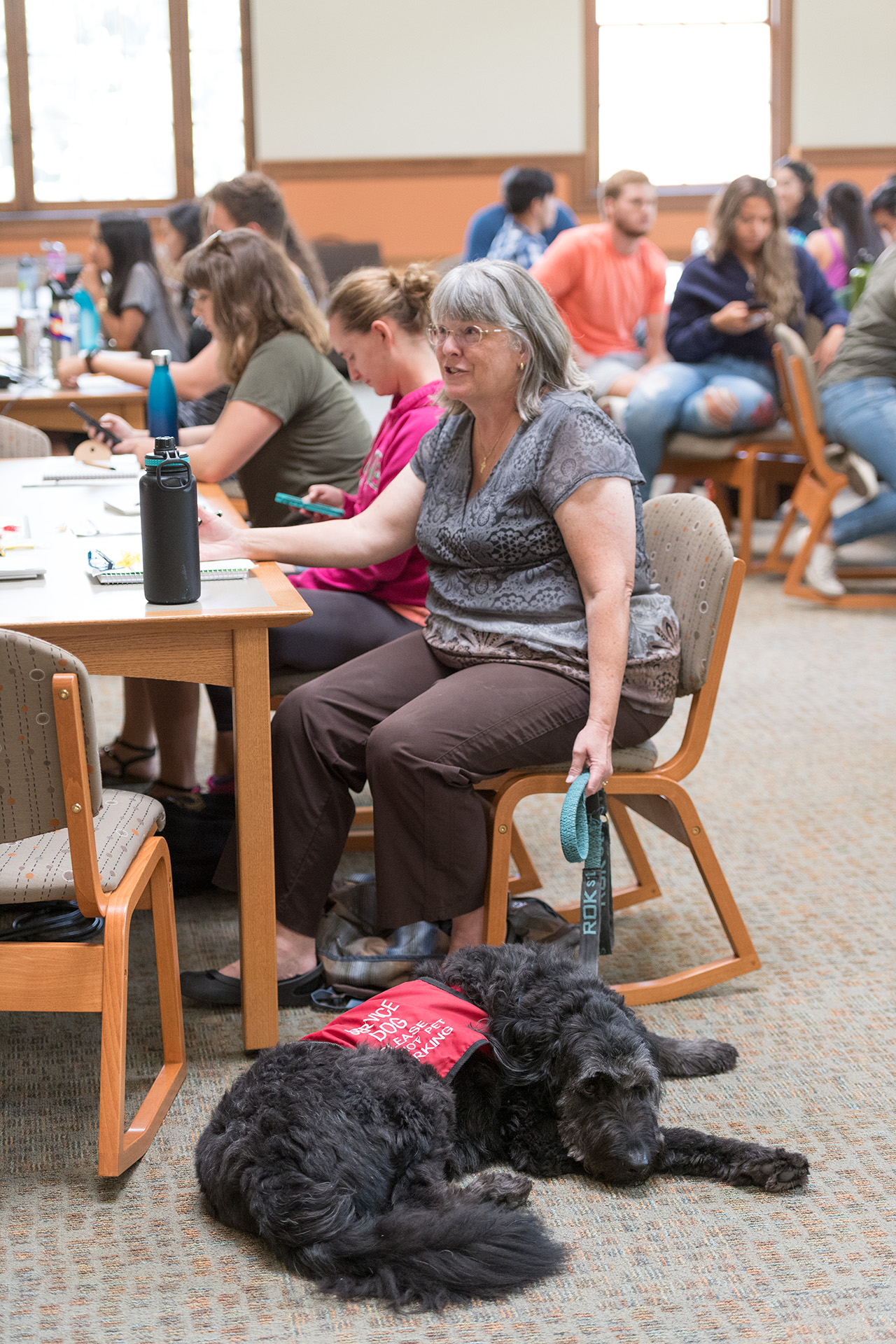
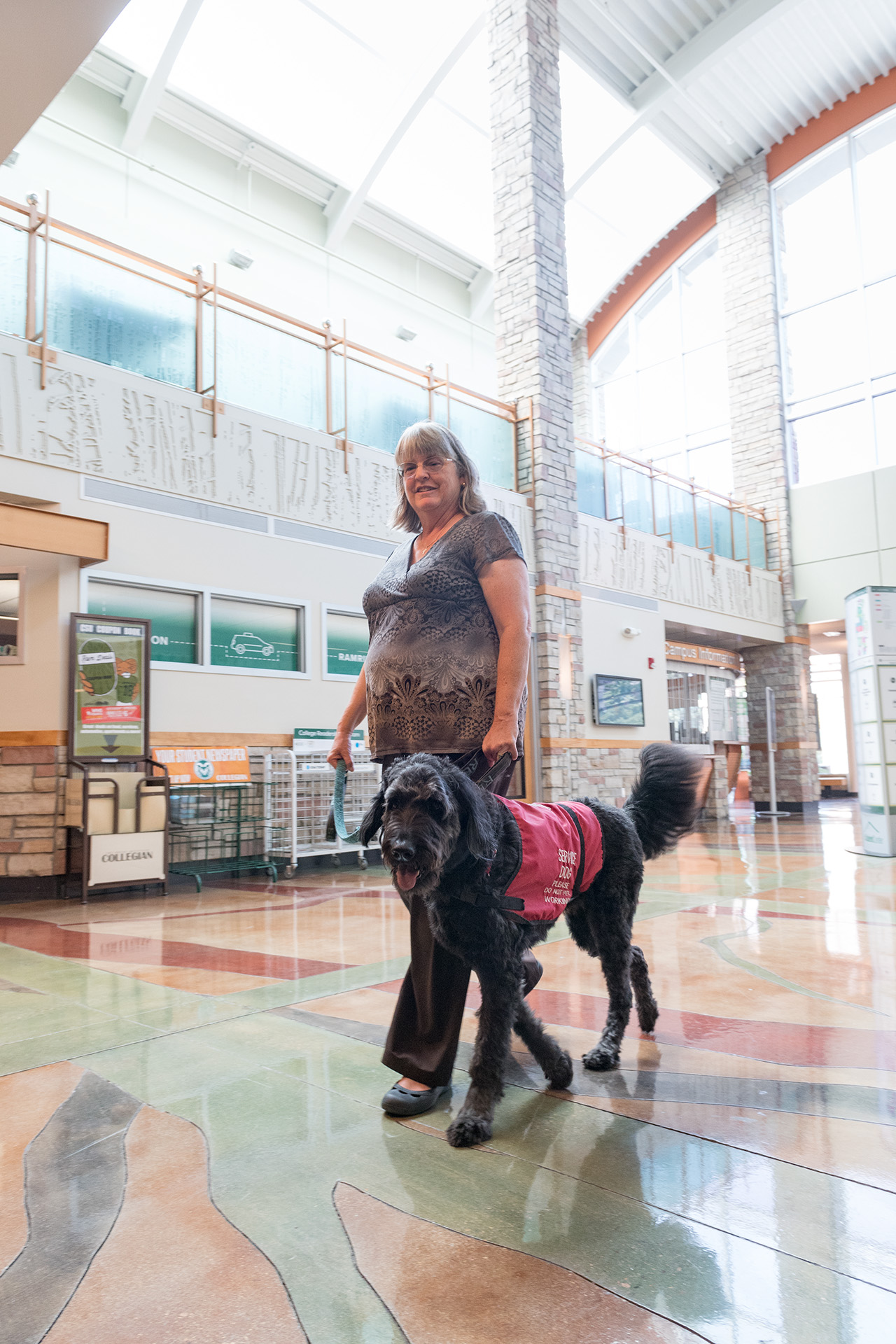
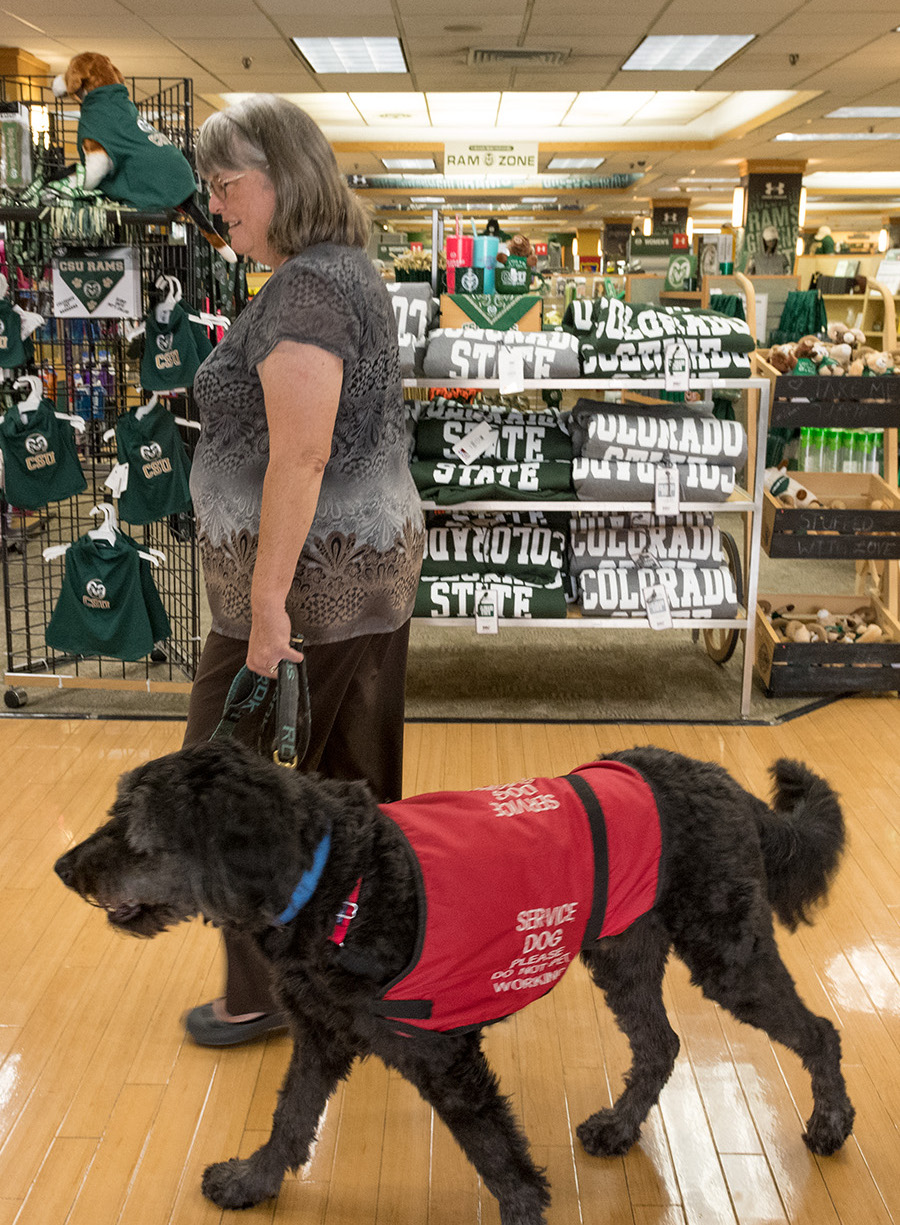
Service animals on a leash can accompany their person on any and all business on campus – to class, the bookstore, the financial aid office. But they must be well behaved and under control at all times. If they show aggression toward other animals or people, even service animals can be asked to leave a building.
“If you encounter a person with a service animal, remember that the dog is working,” Ivy said. “Always ask the person if it’s OK before petting or talking to the animal. And beyond the two questions, you shouldn’t ask about the person’s disability.”
If you’re riding a bike or a longboard, be particularly careful not to startle any animal as you go by.
This is not a service animal
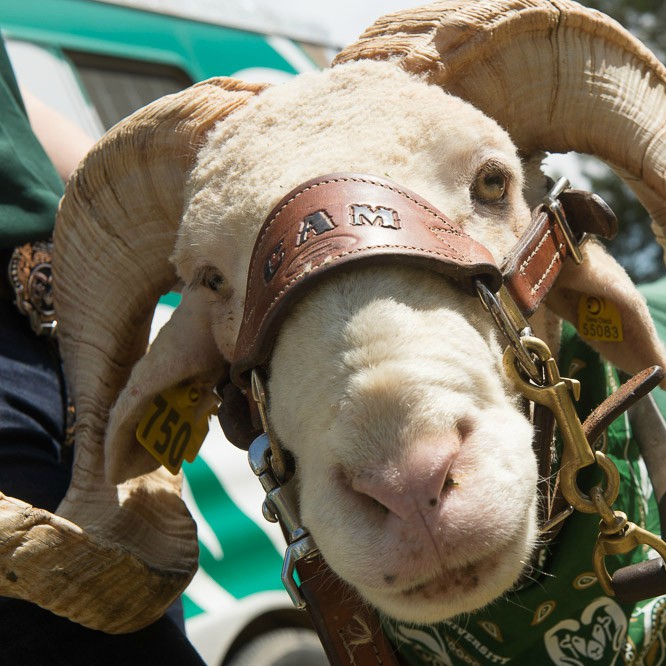
OK, so CAM wears a vest and is always on a leash and is very well behaved while on campus. But he’s a Ram, and only dogs and miniature horses can become trained and certified service animals. Ivy says there has never been a service horse on campus – yet.
This is not a service animal
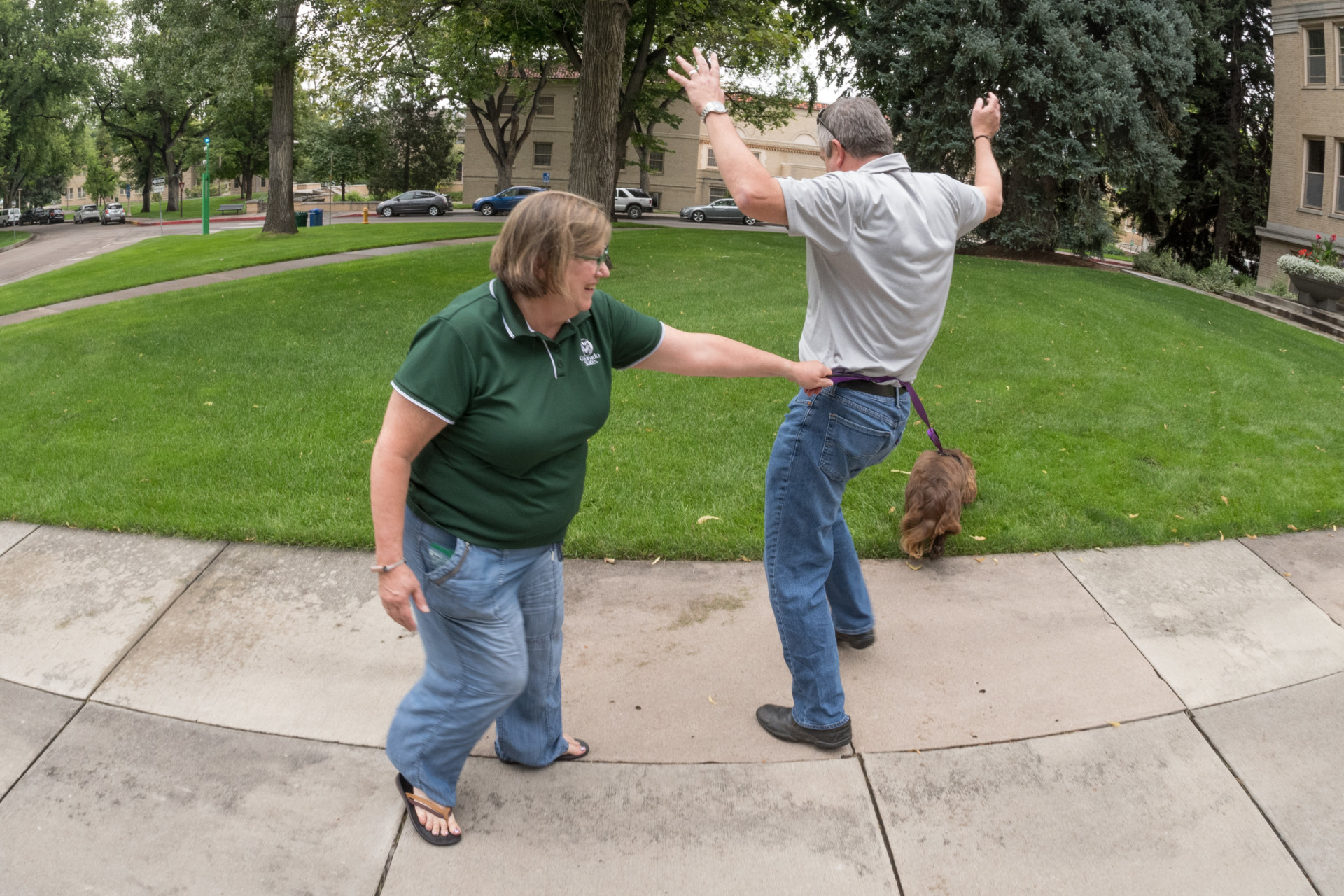
CAM may be well behaved, but this dog is not – he’s pulling on the leash and is obviously not under control. This animal is a pet, and as such is not allowed in any campus building, although he can walk around campus on the leash as long as he is not harassing or threatening anyone.
Under the law, if a dog bites a human on campus, regardless of the circumstances, CSU police and Larimer County Humane Society must be notified, and it could result in the dog being euthanized. So leave the excitable pooches at home, for their sake.
This could be an emotional support animal
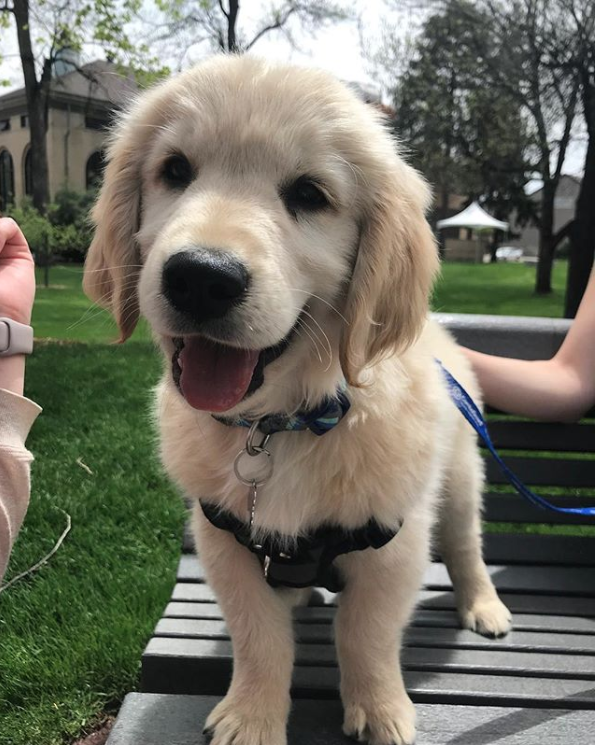
According to John Malsam from University Housing, the number of students requesting to keep emotional support animals in university-managed housing has skyrocketed in recent years. About 300 students are now caring for puppies, kittens, rodents like guinea pigs and sugar gliders, birds, reptiles and fish in their residence hall rooms or on-campus apartments, but only after they have gone through a process of certification.
“Emotional support animals are not covered by the ADA, but are considered an accommodation for a substantially limiting disability,” he explained. “We work closely with the Student Disability Center on the determination.”
The process is rigorous. A student must provide:
- Documentation of the disability – and the animal’s role in care – from a mental health or other professional who has treated the student
- A formal request to the Student Disability Center’s Accommodation Specialist, made in person.
- If the request is approved, the student must meet with appropriate housing staff to review the rights and responsibilities of having an animal in the residence hall
- Vaccination records and current certificate of the health of the animal from a veterinarian
- A crate or other container where the animal can be comfortable and quiet
This is not an emotional support animal

Wild animals, no matter how cute and even if they were raised in captivity, are not considered emotional support animals and cannot be kept in university-managed housing. Leave the squirrels in Sherwood Forest.
This is where emotional support animals can go on campus
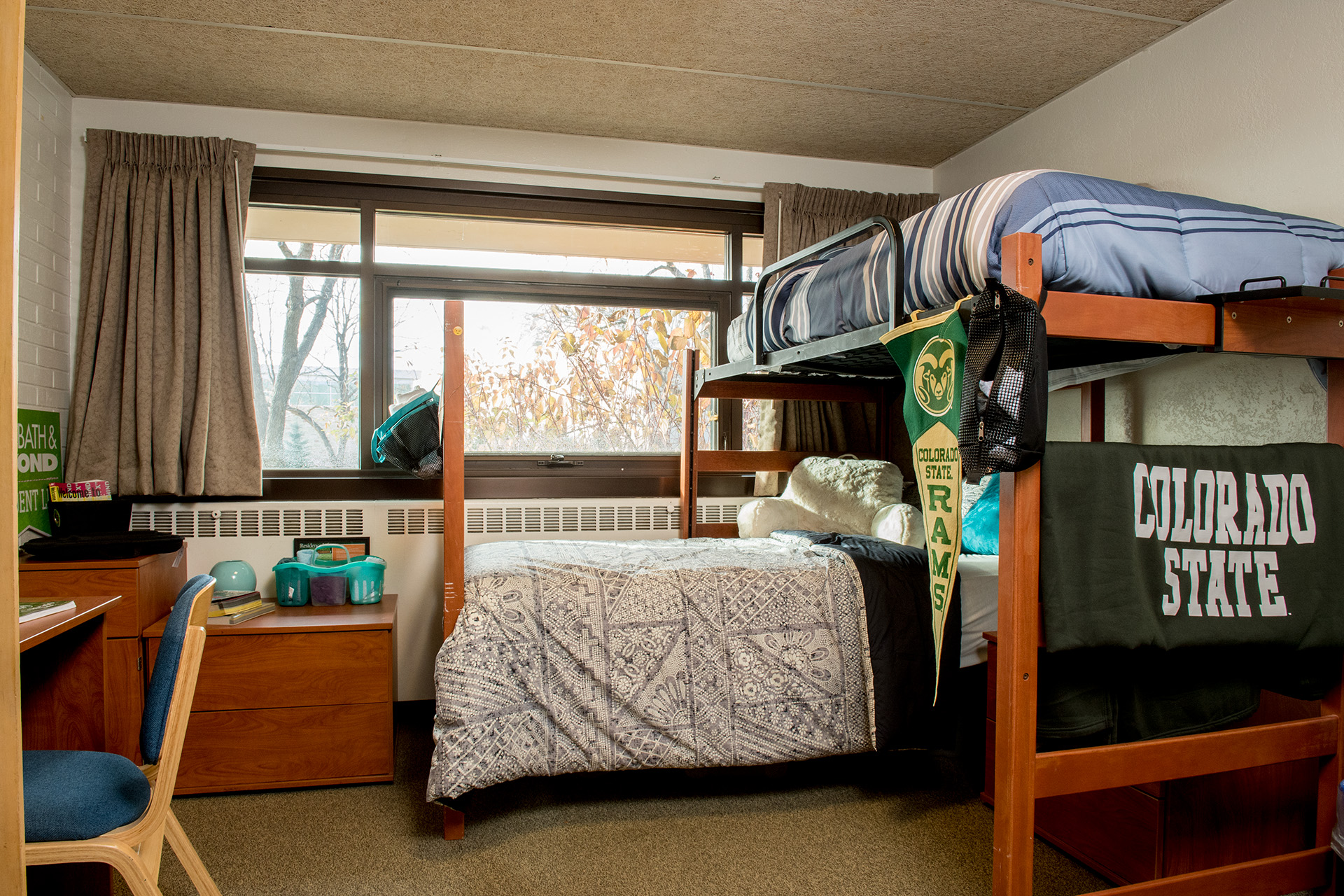
Except for necessary trips outside for bathroom breaks or exercise, emotional support animals must remain in the student’s room. The student is responsible for cleaning up after the animal as well as for any damage caused, as covered in the residence hall contract. Roommate issues caused by the presence of an animal are dealt with on a case-by-case basis, according to Malsam, who said his staff is most concerned that students who need support receive it.
“We also have to consider the welfare of the animal who is along on this journey,” he added. “If we see that the animal is struggling to live in the situation, we may ask the student to take it home.”
This is where all other animals can go on campus
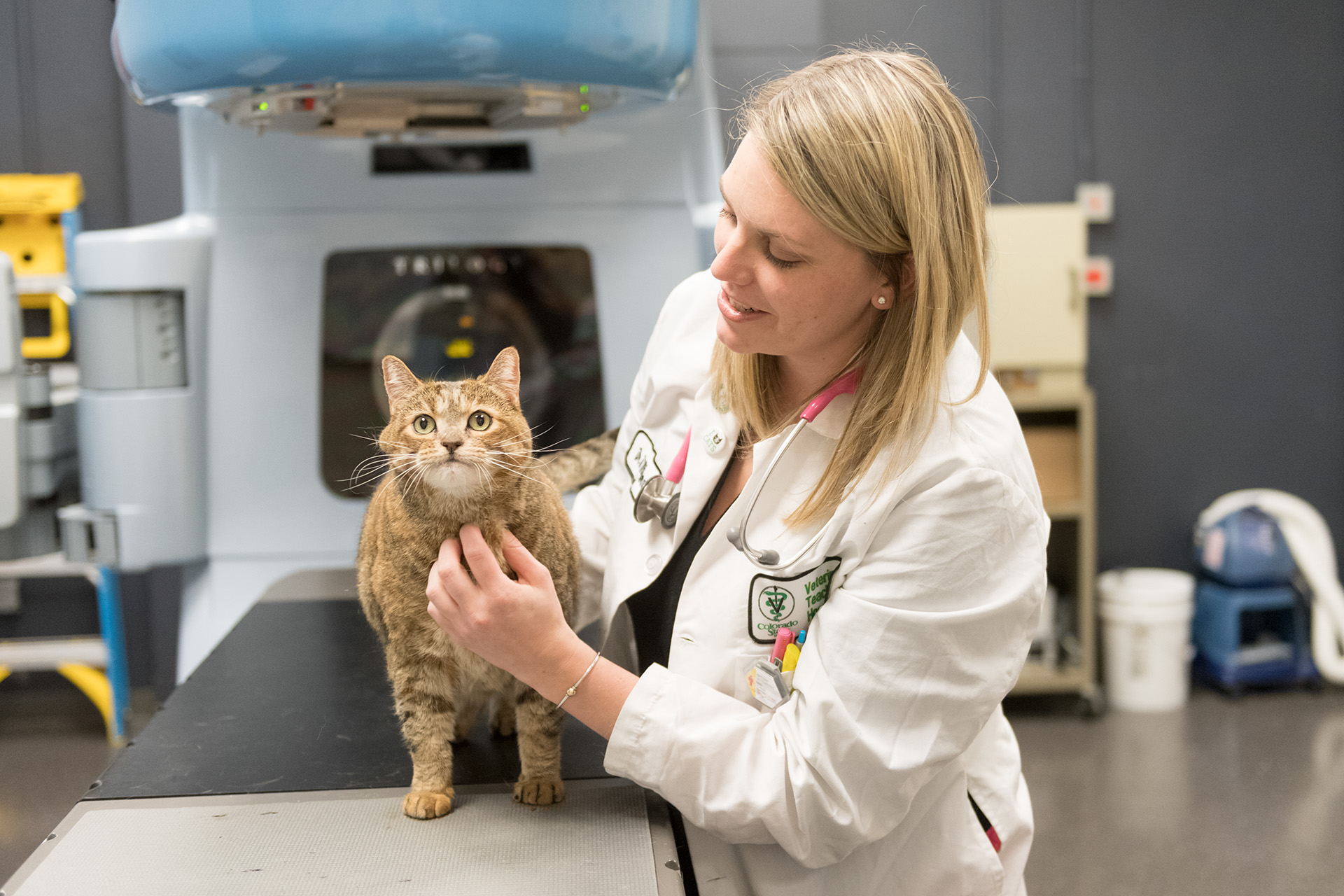
Pets and emotional support animals can walk outside but cannot go into classrooms, office buildings or spaces like the library or the student center, without special permission such as for a De-stress with Dogs event. Not in any building on campus, unless they are receiving care at the Veterinary Teaching Hospital.
By the way, under Colorado law, falsely claiming that an animal is a trained service animal is punishable by a fine of between $25 and $500, so forget buying that fake vest online.
For more information about CSU’s service and emotional support animal policy, go to the FAQs page or the University Policy Library.